How To Be More Self-Sufficient – 7 Tips For Anyone
This post may contain affiliate links. Read our disclosure policy here.
Do you feel like you are relying too much on the government, grocery stores, and other things so that you aren’t able to provide for yourself? It’s important to know basic skills and learn how to make things you need. Here are some ideas on how to be more self-sufficient no matter where you live.
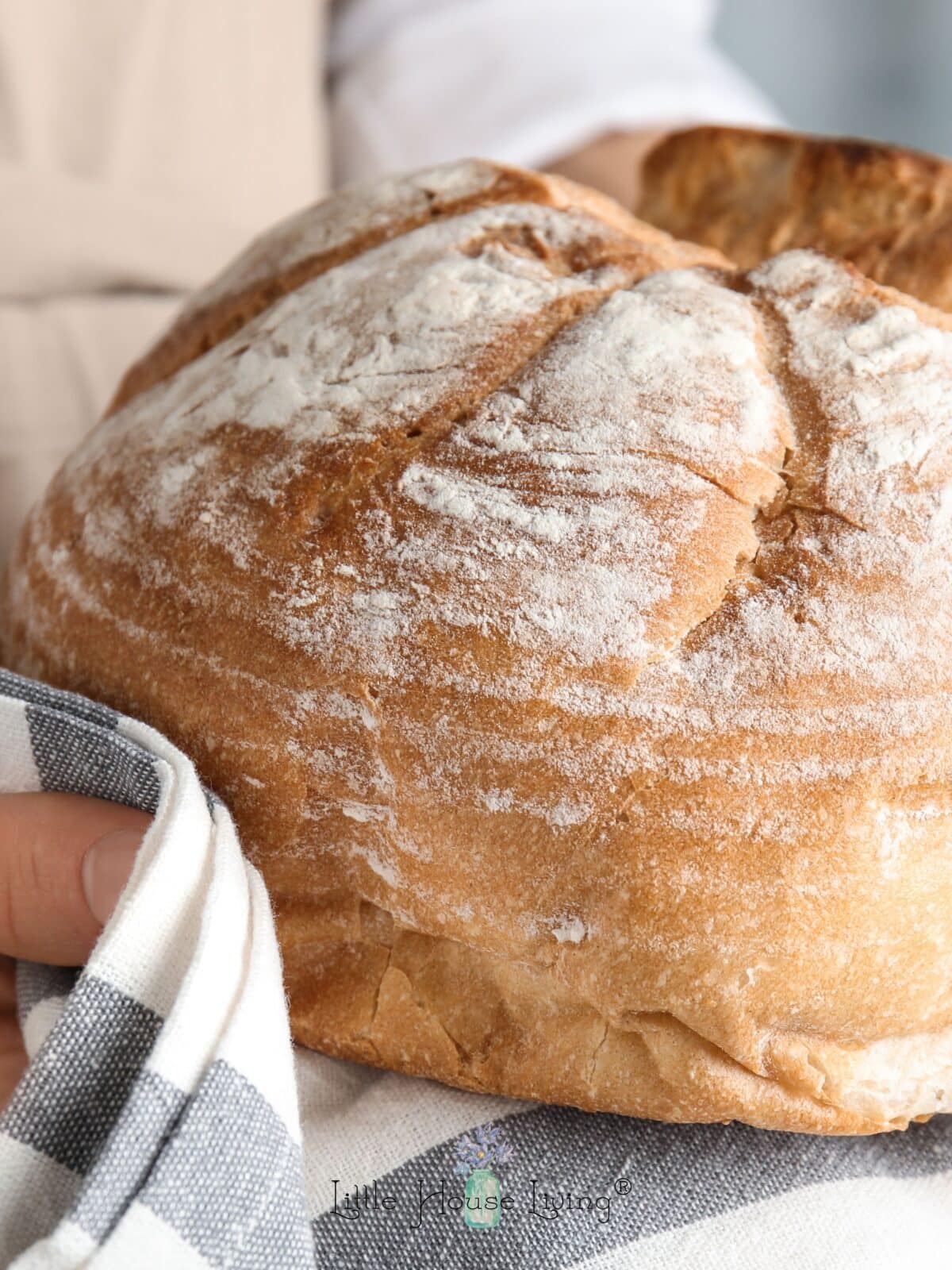
Ways Anyone Can Be More Self-Sufficient
I firmly believe that being self-sufficient is one of the most important things a person can do. We rely on someone else for almost everything in our lives…
We rely on the electric companies to keep our homes running. We rely on the propane companies to keep our homes heated. We rely on the grocery stores to keep our families fed.
What would happen if one of those resources were suddenly gone? Would your family be able to find an alternative? Would they be able to get by until things were restored?
I’ve heard many excuses over the years…
I can’t be more self-sufficient because I live in the city.
I can’t be self-sufficient because I live in an apartment.
I can’t be self-sufficient because I don’t have room for a garden.
Just excuses! If my family and I can be somewhat self-sufficient in an RV, I’m pretty sure anyone can take steps to be more self-sufficient no matter where you live or what you have! Today, we are going to talk about a few things that ANYONE can do to become more self-sufficient. Make sure to add your ideas in the comments too!

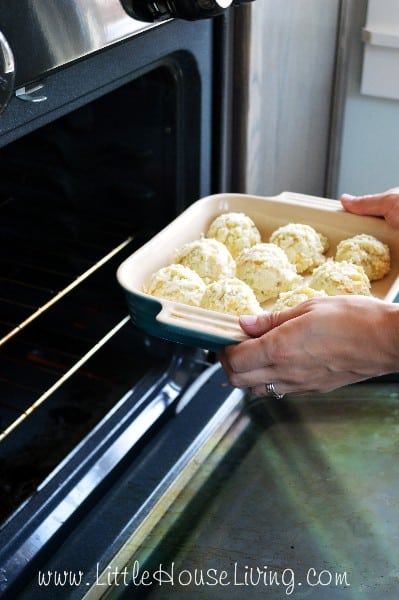
1. Learn how to do basic skills on your own.
Anyone can learn a basic stitch. You don’t even need a sewing machine. Find someone in your family or a friend who knows how to sew and ask them to show you how.
Learn how to cook. You don’t have to be good at it! It’s easy to learn to make a basic loaf of bread, even if it’s just a quick bread! There are so many basic things you can learn to do or even learn to do in some complicity.
Tip: Here are some good basic skills to learn.
My personal mantra is this: “If it can be made in a factory, I can make it here at home! If it can be grown in a greenhouse or field, I can grow it here!” No matter what, I can do whatever I need to do to do it myself. I live on two acres and consider that more than adequate to someday be totally self-sufficient. And I’m going to be sixty! When we are broke, I can always find something to make nutritious meals. It requires nothing more than a willingness to experiment and an open mind. I also forage for edibles, which are among the healthiest foods on the planet. And I can’t even begin to describe the confidence each of these abilities has given me. As your reliance on outside means goes down, your confidence goes up. I guarantee it!
Laurel, Little House Living reader
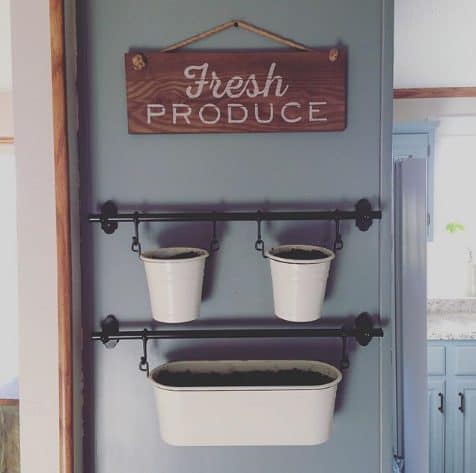
2. Plant a garden.
Yes, anyone can plant a “garden”! Whether it’s a traditional garden or not, you can still grow veggies in your own backyard or even right in your house!
We had no space indoors or outdoors to have a garden in the RV, so I had some pots with vegetable plants just right outside my door. It might not be much, but we were able to have fresh beans, grape tomatoes, and cucumbers with our meals in the summer.
Tip: Here are more tips on growing a garden in a variety of spaces.
We grow a large garden and can what we don’t eat right away. Also, we raise our own beef & chicken (free eggs!), and we cut our own wood for heat. To me, the ultimate self sufficient way of living is the way it was before electricity, grow all you can and preserve everything.
Vicki, Little House Living reader
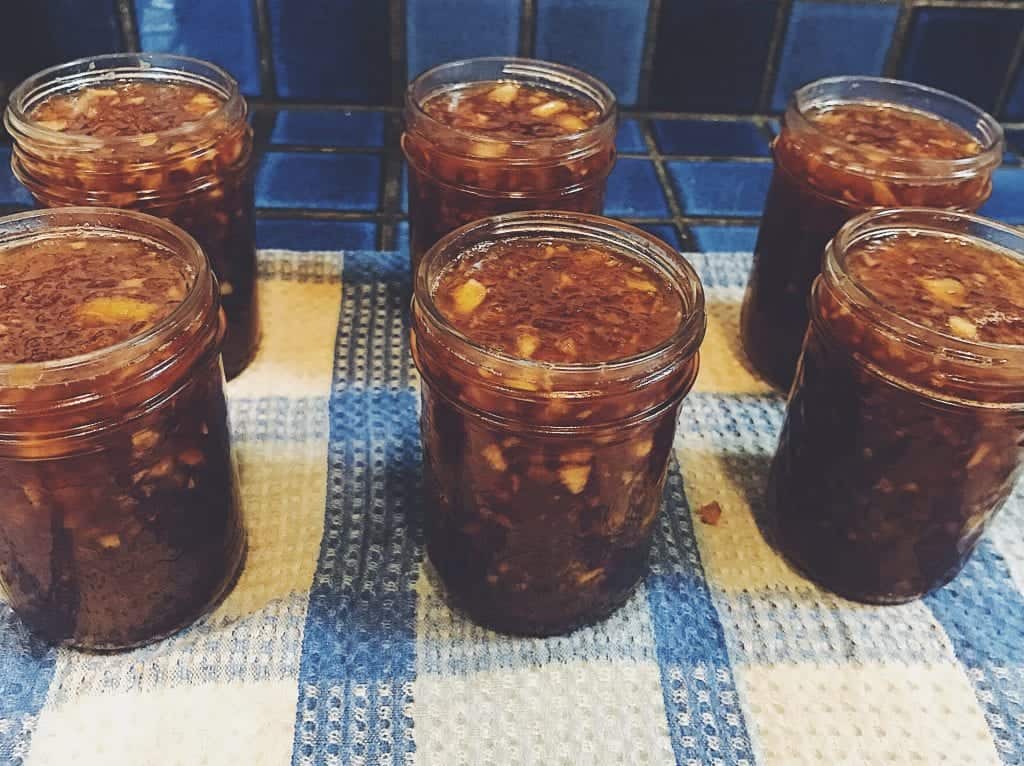
3. Learn to can.
Anyone can learn to can and preserve! It takes a few steps, but it’s so easy! If you don’t have a large enough garden to can all your own produce, you will still have to rely on someone else or a farmer’s market to get produce. But by knowing how to can, you can stock up on that produce when you find it and have it saved for when you really need it.
I could even can in my RV, thanks to my water bath canner and the basic propane stove! Freezing is also a good way to preserve it, although I prefer to rely on a method that does not involve electricity. If you’ve been nervous about canning, read my post on Safe Home Canning first.
Tip: Here are some simple canning recipes to try.
We rved since 1999 i canned and raised vegies in pots last year 1 canned over 300 jars there are all kinds of spaces in rvs to stash your jars
Lola, Little House Living reader
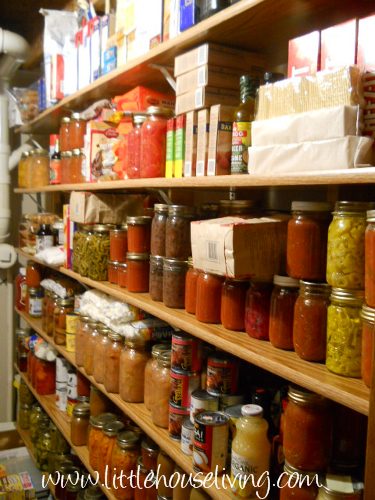
4. Make sure your home is stocked up with basic things.
Basic tools, food to last more than a few days, appropriate clothing, and bedding will all make you more self-sufficient than the average person.
Tip: You can read all about Stockpiling here.
I use coupons to stock up on basic needs in case of emergencies.I try to have at least 6 months worth of nonperishables but my goal is a years worth.
Julie, Little House Living reader
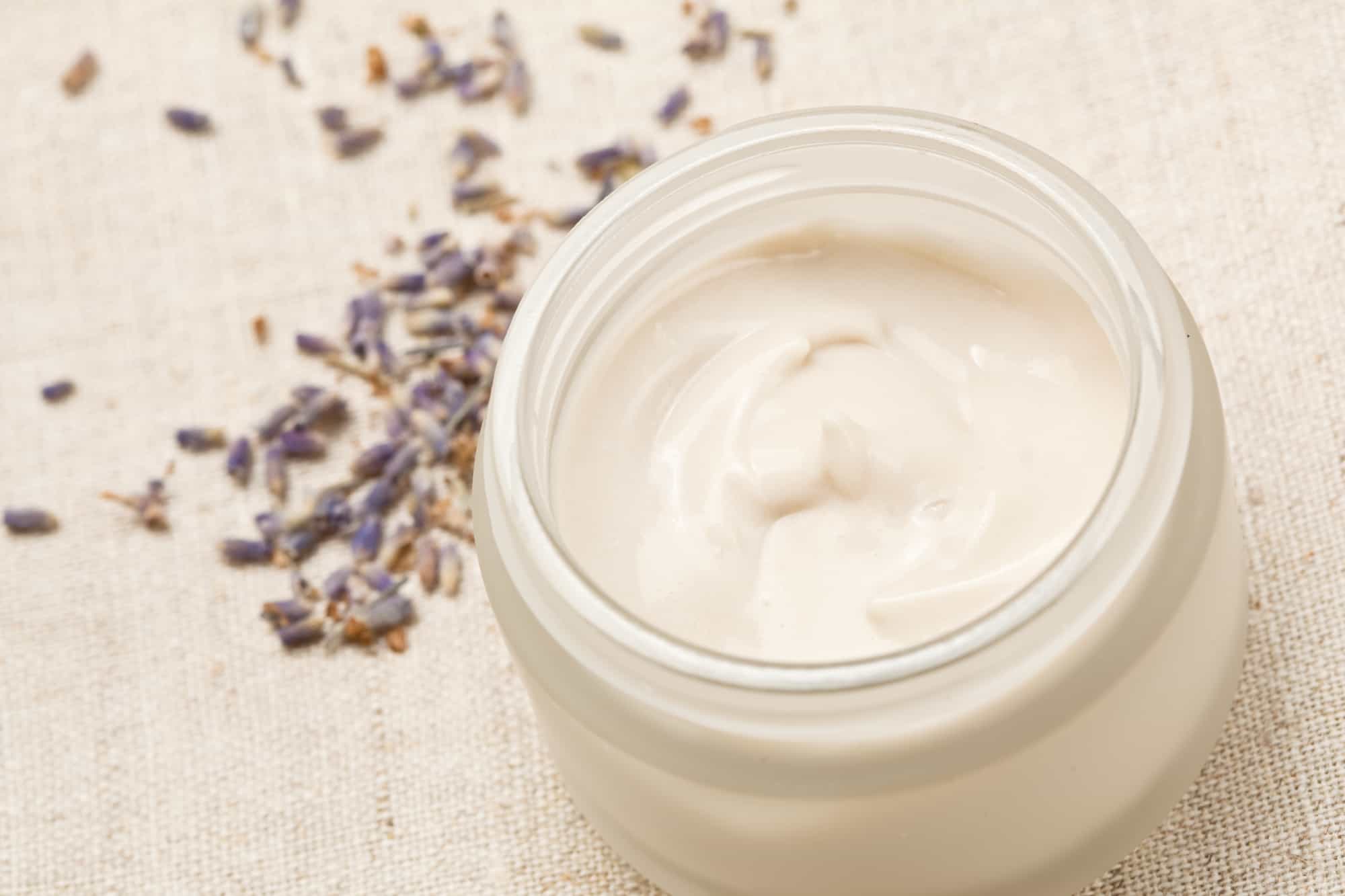
5. Have a thorough first aid kit.
Many issues can be taken care of by yourself without the need for a doctor as long as you have the appropriate first aid items in town. A small idea about herbal remedies and keeping supplies on hand so you can make your own remedies is also very beneficial.
Tip; Get all of my DIY recipes here!
Know how to handle medical emergencies for yourself and your livestock. If you volunteer at a shelter, you’ll learn how they treat minor and serious medical conditions. Or get a copy of the Merck manual. Order meds online. A previous poster mentioned using vet-labled meds for humans. She is entirely correct. Know which eds treat simple illnesses and follow dosing instructions.
Jo, Little House Living reader
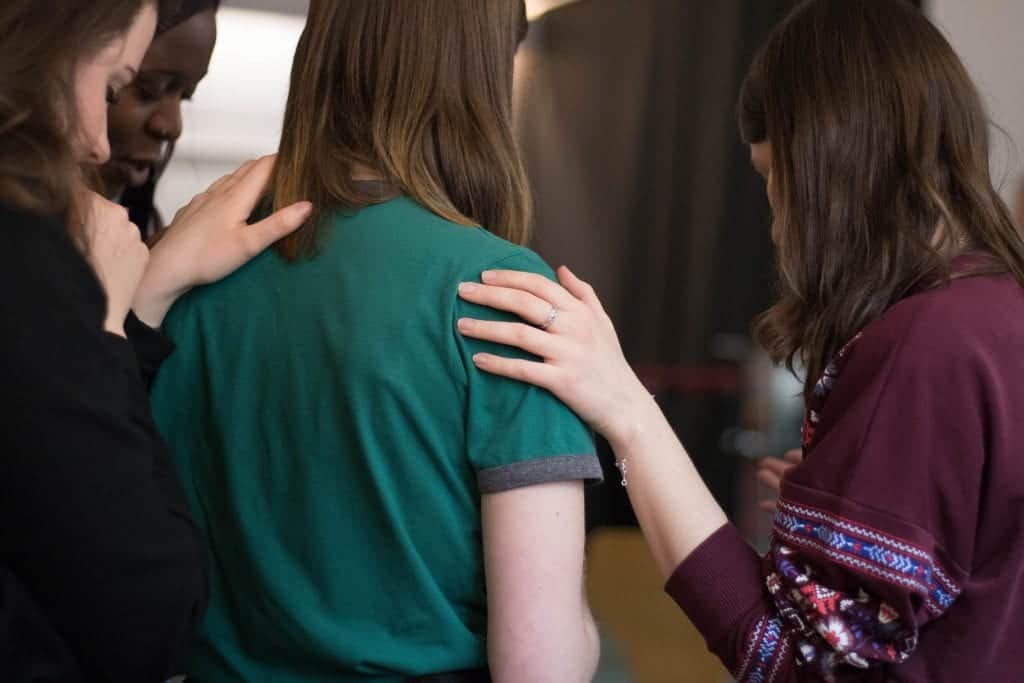
6. Utilize your friends as a resource.
Instead of depending on a store or a stranger, use your friends and family as your resources. Buy fresh eggs from someone you know. Get extra garden produce from a friend that has extras. Learn skills from your friends that you want or need to know.
Most importantly, fellowship with each other. Basic human-to-human contact is becoming a lost skill, and yet it’s 100% necessary for success in life. Make friends and be a friend.
I think a good idea is to work on ‘bartering’ skills. I ‘trade’ my skills in canning and using my dehydrator for produce that people have but don’t know what to do with. We both win – ending up with food for storage! (LOL, although I do ask for the jars back to use for the next season!)
Deb, Little House Living reader
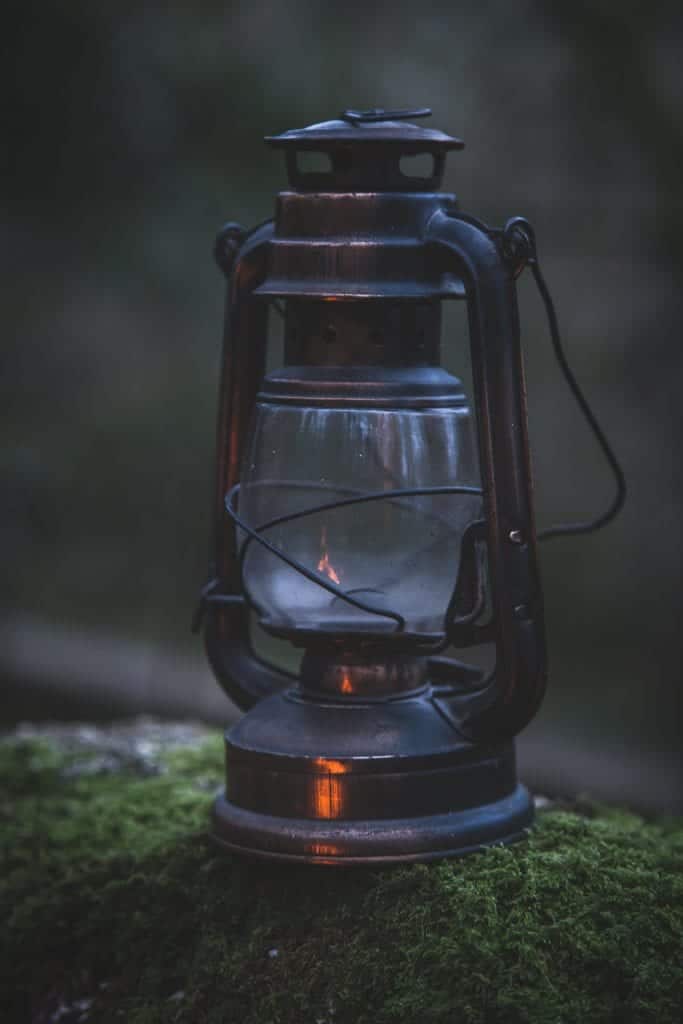
7. Learn to conserve.
Even though at this time you may not need to conserve things like electricity and water in the future, you may need to know someday how to survive on less than what you are used to.
So, find ways around your home to use less water or discover items that will help you use less electricity. It’s better to learn how to live on less now than when you don’t have an option!
Tip: Here are some Old Fashioned Ways to Conserve.
We played the One Gallon Game with our children. Each family member lives off a gallon of water for 24 hours, for everything! Cooking, eating, drinking, washing! It’s a challenge!
Marla, Little House Living reader
We also played the Just One More game at the grocery store: when you buy an item you add “just one more” into your cart for the future.

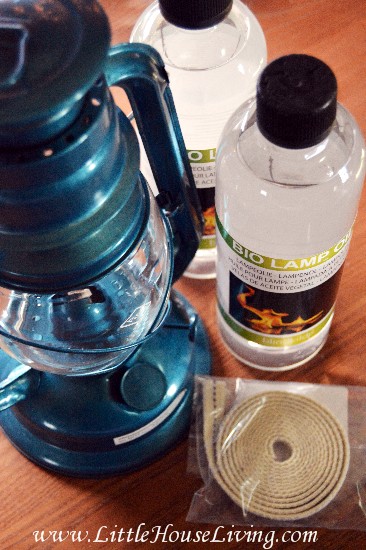
You can start with these easy things to become more self-sufficient, no matter where you live or your situation. If you are working towards becoming more self-sufficient, write out this list and get started! Can you work on these things over the next 30 days? In the meantime, we also have some other great articles here on Little House Living that you might want to check out on the same topic.
- Emergency Preparedness List
- Emergency Foods Supply List (Whole Foods to Stock Up On)
- Items You Need For Basic Skills
- Off Grid Small Kitchen Appliances Worth Owning
- Creating a Winter Emergency Survival Kit
- Prepare for a Tornado and Create a Mini DIY Emergency Kit

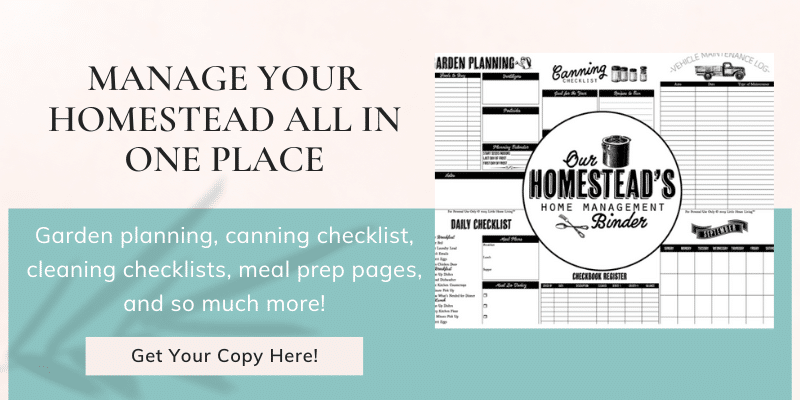
What are some things that you think anyone can do to become more self sufficient?

Merissa Alink
Merissa has been blogging about and living the simple and frugal life on Little House Living since 2009 and has internationally published 2 books on the topic. You can read about Merissa’s journey from penniless to freedom on the About Page. You can send her a message any time from the Contact Page.
This blog post on how to be self-sufficient was originally published on Little House Living in July 2013. It has been updated as of January 2024.
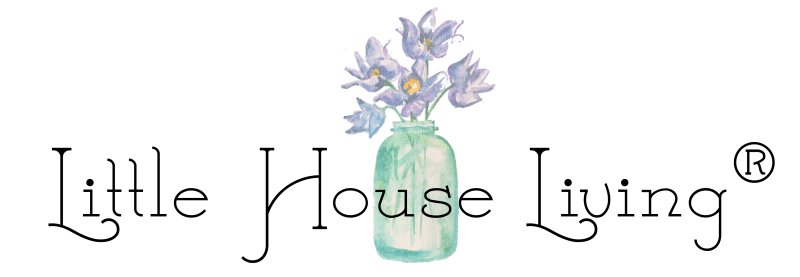


What great ideas. I enjoy your blog so much. 1) I am a newbie in learning about the healthier, more frugal, sustainable lifestyle and 2) we are RVers and find your “camping” lifestyle fascinating.
blessings,
Shan
http://www.The-How-to-Guru.com
we rved since 1999 i canned and raised vegies in pots last year 1 canned over 300 jars there are all kinds of spaces in rvs to stash your jars
I think a good idea is to work on ‘bartering’ skills. I ‘trade’ my skills in canning and using my dehydrator for produce that people have but don’t know what to do with. We both win – ending up with food for storage! (LOL, although I do ask for the jars back to use for the next season!)
Yes, bartering skills are very important. 🙂 I usually just give away what is asked of me, without even thinking if they could give me something in exchange 😀
Oh Merissa…you know you are going to have to can something this summer. You will miss hearing the ping of those jars sealing! I have been in a 32 ft fifth wheel for two years now. I haven’t missed a beat (or is that beet?? LOL!) when it comes to canning. I do all the prep in the kitchen for sanitary reasons but the water bath and pressure canner will not fit on my stove. It also takes too long to boil the water and then it heats up the house for way too long. Simple solution… a propane Coleman portable BBQ. You’ve seen them the red ones with the side burner. They fold up to take camping and tailgating! I bought one for my husband for his anniversary a few years back. It works GREAT for the canners, and an added bonus…because it’s a BBQ my husband likes to run the thing and ends up keeping an eye on the canner!! Win, win for me!!!
I’m canning this summer! I’m just borrowing regular stoves so I can do it 🙂 I want to get a single burner so I can can outside on my own next year.
You know, I have thought of the same thing…I am really thinking of getting an old electric stove that I can put out in our garage, to do the canning with..It is cooler out there in the summer & I think it will keep the house from getting too hot & all the mess with canning..I think I can make the area just as clean as the house..people used to have canning sheds back when.
I have a glass top stove and my pressure canner says not to use it on a glass top stove. So I bought a Bayou cooker with a propane bottle. It works great outdoors.
I am old enough to remember when my mother prepared the old Kerosine lamps each night to furnish light, and when she did clothes she heated the water in an old wash tub, and scrubbed the clothes on a washboard. She hung the clothes on a line, having no dryer, and each day she fired up the cook stove to cook breakfast, and the same for several other meals for the day. We had no refrigerator but we did have a smoke house for the pork that was butchered in the fall. The pork was salted down and store down on tables in the smoke house.
The cows milk from our cow was stored in a cooling house that was built on the lower level of the smoke house, and thats how food was kept cold even in summer, because this building was built with thick walls and was very cold year round.
I bring a lot of these ideas into my life, although i do have modern conveniences and i cut costs everywhere I can by making everything from scratch, and shopping for food much like they did back then before we had electricity and all the modern conveniences.
I’m very happy to read this blog, and know that some of these things are being passed on to those who want to learn, because back then we didn’t have anything very modern and we didn’t know any better and so we too were practicing some of the things you are doing.
a lot of the pork at butchering time was canned in jars, even sausage patties and chunks of pork to use in re ceipes and to eat heated right from the jar for meals.
There were gallons of apple butter, and also sorgum mollasses made from the sugar cane and a community syruping took place in the fall, the product was put in sealed tin cans and distributed to those in the neighborhood who grew and made the syrup and participated in the making of it and that was the majority of our sweetner for the winter.
And of course in the spring the sugar maples in the woods was tapped and the sap was gathered to cook down into pure maple syrup.
I made taffy from the sorgum mollasses.
Now I am making everything from scratch, bread, cookies, crackers and I’m pretty good at it. I know what goes into the baking mix I put together and I am adding lots of whole grain to the basic unbleached flour to give it more nutrition.
Keep up the good work because some of the younger people who read your blog needs to learn how to be more self suficient and i think they want someon to teach them the old skills.
Rosemary I wish I could come watch & learn from you!
Rosemary, you are awesome! I wish I could come learn from you too! I make everything from scratch too, it’s a great way to save Monet, feed your family healthy nutritious meals. We heat with coal. We do our best live live a country life in our small apartment in a small urban city.
Acquire the things necessary to hunt and fish. I know many people are uncomfortable with guns, bows, etc., but if you had to be self sufficient, hunting is a important source of food. Learn safety measures, keep them locked up, but don’t be caught with no means to hunt. Fishing is also a great way to assure your family eats…and the supplies don’t need to be expensive. We buy our equipment at yard sales and clearance bins off season. Make a point to know where nearby bodies of water and rivers are so if you need to fish to survive, you will know where to go. And don’t wait for a crisis. Supplement your current food needs!
My husband recently learned that many meds used by veterinarians are the same as meds we are often prescribed by our own doctors. (He asked our dr. about this and it is true) Medicines like penicillin, cipro and others are available on veterinary medicine sites and can be ordered. This is a good idea in case of some sort of meltdown. Also, buying grains from farmers and storing them to use with your own grinder is a good idea. If they are stored in mylar bags in buckets (look on the internet for how-to’s) and kept in a temp. controlled environment, the grain will last for 20 years or more.
You can also go to a pet store that sells fish. They have the same antibiotics that are given to humans for sale there. Purchasing in bulk from a vet supply is the best cost effective plan but if you need them in a hurry the pet shop is handy.
My main worry about using antibiotics from a pet supply store is this – how does one know the proper dosage? A secondary concern would be about self-diagnosing an illness, and being wrong. How would you address these concerns?
first time on your site and I simply love it…it is warm and unpretentious…I am 63 and take care of elderly Mother….I don’t have much time to indulge but whenever I can I am drawn to creative things. Keep up the nice work!
Welcome!
if you think about it… if had no power, those other resources would also be useless…..
Who needs power? As long as we have wood and a creative mind we can replace eletricty cooktops. You can boil water over an open fire or use a box stove, plus you can use heat from your fire for dehydrating. And never forget about root cellars for storing food for the winter. Country Boy Will Survive.
There are also solar ovens, which are pretty easy and inexpensive to make.
Store toilet paper! Every shopping trip, even though we don’t need it, we buy a large pkg. Let’s say a global collapse occurs, or a blixzard hits and you have no power or access to a store for 3 week. You’ll be happy to wipe with TP instead of old rags or newspaper. Speaking of newspaper- keep a good supply of those free newspapers handy. It can be used to suppress weeds in a garden and be used to insulate a home or be worn under a coat in an emergency. It’s obviously a good fire starter, too. Defintely need to know how to hunt/fish and process your own kills. Know how to use/ fix simple machinery like drills and sewing machines. Know how to handle medical emergencies for yourself and your livestock. If you volunteer at a shelter, you’ll learn how they treat minor and serious medical conditions. Or get a copy of the Merck manual. Order meds online. A previous poster mentioned using vet-labled meds for humans. She is entirely correct. Know which eds treat simple illnesses and follow dosing instructions.
Don’t forget to stock up on garbage bags at the same time you are stocking up on TP. You will want to bag ALL toilets so that the waist doesn’t contaminate the area making everyone sick, Having extra’s of anything in an emergency can allow you to barter with others for what you may need.
I use coupons to stock up on basic needs in case of emergencies.I try to have at least 6 months worth of nonperishables but my goal is a years worth.
I’m loviing becoming more self sufficient!! I realize that its much easier for us living on 80 acres with all the wood we need and plenty of room for animals and gardens but we still are having to make ourselves put out the effort and stop relying on others for everything. Just this week we have shut the propane off to our cookstove and put the wood cookstove into full time service (before it was just kind of a novelty I used occasionally) since propane more than doubled in price overnight, it became a necessity!! Like you said, you never know when you’ll need to be self sufficient! Thanks for the encouragement!!
Love your blog. So much great information. I feel it’s critical to learn self-sufficiency. It used to be the way things were done before power, oil and public water systems came along.
If we conserved all the time with power, water, gas or whatever we use to heat then it wouldn’t be a hardship when one has to. I am currently looking for an RV to pull onto my 27 acres and get started with my own self sufficiency plan. I am blessed with good hunting, fishing and 27 acres of trees and fallen timber. It would take me years to clean up the forest floor before I touched a tree.
Thanks for your time and efforts with your blog.
We grow a large garden and can what we don’t eat right away. Also, we raise our own beef & chicken (free eggs!), and we cut our own wood for heat. To me, the ultimate self sufficient way of living is the way it was before electricity, grow all you can and preserve everything.
Thank you so much for sharing that info! I honestly believe that in today’s society, many people have either been taught or have assumed that they have to rely on others to do the basics for them. I told myself that I would teach my son and daughter to do the basics before the they get on their own: (basic) sewing, cooking, laundry and personal care. We try to follow these ideas at home, not only to save money and time, but to conserve and learn to do for ourselves.
Making your own personal hygiene products is a great way to become a little more self sufficient, save some money and be a little healthier. I’m not just talking bars of soap. Shampoo, laundry soap, deodorant, many things can be made at home. Usually supplies from a food co-op are needed but those supplies go a lot farther than the ready made store bought product. You can even make your own hair dye if you’re so inclined. And while they may not be for everyone, home made, reuse able maxi pads are great.
I started planting a huge garden and canning everything a few years ago when we bought our first house. People kept asking me why I went to all that work while in was pregnant and had little children and worked full time. Eventually I became a stay at home mom, life took us in a direction other than we had planned, and we took some financial hits. Had it not been for all the food stored in the pantry, improving my baking skills, my husband cutting wood for our wood stove we invested in, I’m certain we would have been in crisis. Hard work invested paid off. I continue to find ways to become more reliant. Homemade laundry soap, making quilts in my spare time for my kids, learned to butcher chickens I got for free and also how to can meat. Every bit helps.
Some may not need to be self sufficient now, but the skills are invaluable should the need arrise.
You mentioned canning meat. I do can vegetables/fruits/things like that but have never canned meat. May I ask, what kind of meat do you can and where do you find your canning “recipes” for that? I want to try to can some of ours instead of putting it all in the freezer but I have been a little more afraid of doing it. Thanks. 🙂
So far I’ve got a recipe up for Canning Chicken and we are working on the one for Canning Beef right now 🙂
My mom used to can beef. I don’t have her recipe or how she did it, but it made the most wonderful meal and the absolute best sandwich spread ever.
we would grind the canned meat with some onion, add a bit of mayonnaise and spread on bread. Delicious! The dinner meal, we heated up the contents in the jar and made gravy from the liquid and served with boiled or mashed potatoes. I am a real meat and potato girl, so one of my favorites, with a chosen vegetable of course.
Deanne, I can chicken, pork loin and ground chuck. I cut chicken and pork loin into approximately 1″ cubes and pack down into sterilized 1 pint or quart canning jars and then add 1/2 teaspoon canning salt to pints, 1 teaspoon to quarts. I do not put any water in them, they make plenty of their own liquid. I then process in my presto canner for 75mins./pints or 90min./quarts. I always leave them sit out for a week to make sure they have sealed good. I brown my ground chuck until a light pink, pack down into pint jars (that’s usually a pound) and process for 75 mins. Again if you decide to do quarts, process 90 mins. Canning meats are so easy, the one thing to watch out for is to make sure you wipe the rims with a mixture of white vinegar and warm water to make sure there isn’t any grease from the meats on the rim or the jars won’t seal or they will come unsealed. Happy canning! p.s. If you go to Youtube you can search Katz Kradul or Obsessive Prepper and they can show you how to can anything.
Great ideas. I will add a couple of things too. About the growing of vegetables-I was reading in our local paper this past week about being able to grow certain blueberries & blackberries in pots when you don’t have the space, and have since heard others saying it is true. That is what we are going to do this year to add to our strawberries in the hanging pots. Also, for a garden, because of the payout of our yard we can’t grow much in there, as a full garden, but my mom had a lot of room where they used to have a garden. Last year we went in and created the garden space back and now have a huge full garden. If someone can find a family member or friend that has the room, trade off with them-you go do the work, they handle some of the watering duties possibly (if you can’t get there) and you repay them with giving them some of the food you grow/canned goods that you create. For things like corn, we have a friend that has acres of it and she sells the first of the crop once they go through for really cheap to people she knows. We go over and pick-I can get a freezer full of processed corn for about $20. You just have to be inventive and think outside of your own space.
Love this post! I think one thing that is an advantage with homeschooling is passing these skills onto your children. We are not perfect at that, but we do try! Now that we have 3 acres- we are thrilled to do a bigger garden!!!
I also live in an RV and we travel most of the year. When we sit still for any length of time I stockpile what I can safely carry (weight is an issue when you’re on the road) because everyone knows buying in bulk saves you money. I even grow lettuce and herbs that travel in my shower when we travel. Again, when we settle for 3 months or more in one spot I usually have potted veggies…fresh tomatoes are ever so tasty! Just discovered your blog and I think I’ll keep reading!
I’ve always stayed away from canning because of the sugar that so many canning recipes require and I’ve read that you should never alter a canning recipe because they are done in such a way as to maintain a particular balance of acid to maintain the food. Is there any way to can food without all that sugar?
All fruits and foods can be canned without sugar. The only difference you may notice is that the fruits might have more of a tendency to change color and they may not be as firm. To help prevent the color change you can simply add a bit of lemon juice to the jar. Personally I use a very very small amount of sugar when I can fruit and then just make sure to consider that in all recipes I make with the canned foods so I either don’t add any sugar to them or add less than is called for. I hope that helps! 🙂
My husband and I also live in an RV, we are retired and live on a very fixed income. I grow veggies in my little garden, also go to the community center where every two weeks they give away produce from the local stores that are getting old, I will take all I can get and process them for the freezer. Last year I processed 50 pounds of tomato’s into sauce, diced and salsa. I received 40 pounds of onions, which I chopped up and popped into my freezer for this winter, 10 pounds of whole sweet green peppers, which I cleaned and froze some whole and others chopped popped them into the freezer also. Cabbage, zucchini, and green beans. It takes some doing but there are community centers every where that will offer these items for free and a person just has to take advantage and some old fashion hard work and you also can have a stocked freezer.
I have backup heat and cooking. Gas, electric and wood. You can put anything in a canning jar you can buy in a store. There are books that will tell you how. My friend goes to the North Carolina coast every year and cans the fish that her husband catches while it is fresh. She cans chicken, pork and beef. She also cans game meat. I save the large bleach bottles for storing water. Water will last years if you put a drop of bleach to each gallon. Fish can be smoked and dried. There are also many homeopathic and holistic remedies for illnesses besides medicines. Herbs and such store for a long time and meds do not especially once they are rehydrated.
Thanks for the great reminder on how to live more frugally. We need to be reminded more often that living within our means should be a daily event and not just for tough times. I’m no different than most, that will on occasion buy something wanted and not “needed” but will surely use it till it drops. I enjoyed your entire site as well.
Dave
You are speaking my language! I too believe we have to maintain the lost arts of preparing food, preserving food and making the most of what we have. Thanks for the reminders!
This year I will build a rocket stove or two out back to use for canning. I found several designs on Pinterest and they should work well next to my outdoor bar-b-que.
My first efforts at preserving in bottles were on a fire hearth – my stove didn’t throw enough heat and I liked the ability to control the heat with the wood – using a rough wooden table covered with clean plastic feed bags for the bottling process. Now I use a cast iron campstove (that is also our cooktop). It works wonderfully for me! During the warm sunny months, I cook the rice, hardboiled eggs, and thinly sliced meat using a solar “cook-it” kit. I heat water in the back of our Subaru station wagon that has not been able to be repaired. I can use it to finish cooking pasta, potatoes, heat up a bit more for hot drinks or boil it and store it in a Thermos container, so I have hot water in the morning for oats, tea, coffee, etc. This not only keeps the house cooler in the summer, but also reduces the fuel bill for butane and electrical bill for cooling with the fan.
Wonderful post. I would add replacing plastic. We are in the looong slow process of doing so on a budget. When a utensil brakes I look for a new one (to us) in metal or wood. Same goes for containers etc. Another thing that has proven very effective has been to almost wipe out our need for paper towels.. And generally going for multiple use instead of use and throw away items.
I think being self sufficent and living like our grandparents did in the old days was alot easier and healthier. Living in these times today is hard. There seems to be more bills to pay from alot of `things` we don`t need. I to am trying to figure out ways to live more frugal, like planting my own garden, making my own hygiene goods, consuming less, learning to knit my own mitts, hats and scarves, making do with what i have. I really love and appreciate your site. I am also learning alot from it.
Wonderful, what a webpage it is! This website gives helpful facts to us, keep it up.
I’m new to you site. But just glancing at some of your articles. This right up my alley! And I’m looking forward in using your articles as a source of simple living encouragement.
Welcome Paul!
Fab post, one of my goals this year was to begin a more simple approach to life and create a more self sufficient life for my family. Thank you for sharing your tips. I am building raised beds in my garden to grow my own veggies!
My personal mantra is this: “If it can be made in a factory, I can make it here at home! If it can be grown in a greenhouse or field, I can grow it here!” No matter what, I can do whatever I need to do to do it myself. I live on two acres and consider that more than adequate to someday be totally self-sufficient. And I’m going to be sixty! When we are broke, I can always find something to make nutritious meals. It requires nothing more than a willingness to experiment and an open mind. I also forage for edibles, which are among the healthiest foods on the planet. And I can’t even begin to describe the confidence each of these abilities has given me. As your reliance on outside means goes down, your confidence goes up. I guarantee it!
You should not drink water stored in bleach bottles. The plastic leaches into the water and it is toxic. The water is perfectly acceptable for non-potable purposes, though.
We played the One Gallon Game with our children. Each family member lives off a gallon of water for 24 hours, for everything! Cooking, eating, drinking, washing! It’s a challenge!
We also played the Just One More game at the grocery store: when you buy an item you add “just one more” into your cart for the future.
Playing the “One Gallon Game” at home can be fun! For one day, every family member gets just one gallon of water to live on: washing, drinking, cooking. See how creative your family can be with this!
I moved out of the city to West Texas 11 years ago. I have had to learn to take care chickens, dairy goats, ducks and turkeys on my own. I am 61 years old. I learned by reading, since no one near me (nearest neighbor is 5 miles away) is raising what I am raising.
I am expanding my garden a little each year. All are heirloom/non-gmo. I have read where Trump this week has signed an executive order eliminating all regulations on gmo. That includes raising factory meat organs for retail. I am pushing to save my own seeds to cut cost and to ensure what I have. I am also expanding my greenhouse where I store my potted plants in the winter in order to do more winter gardening.
I have a freeze dryer on layaway. It was twice as expensive, because I brought the extra attachment the eliminated oil changing. I would like to have it now, but all things have to be saved up for since I am on a limited budget.
At night all the power is off, except to my propane fridge. I live off grid.
I buy a heifer about every other year and take it to my butcher. The meat is cheaper and I know how it was raised.
To quote a man that use to do odd jobs out here……”The less ties you have to the system, the less control they have over you!”
Dehydrating your food is a good way to keep your food too and they take up a lot less space then canning. . It’s very easy to dry your food. You don’t need a dehydrator, you can use your oven on a low temperature. A lot of times I just lay things on a paper towel to dry. Of course you can’t do that with a lot of foods or they would get moldy. Once they are dry put them in a Mylar bag with an oxygen absorber. They will keep for years.
Definitely nothing wrong with learning skills and being prepared. You remind me. I need to check the dates on the stuff in my First Aid kit.
I think for me – just learning how to cook healthy has been such a huge blessing for me
Another way we can become more self sufficient is by learning how to capture the energy from the sun to cook, bake, boil and more. (And it’s free) My first experience was baking cookies using only a oven baking bag and a windshield reflective shield (from the dollar store). I have since purchased a Sun Oven which keeps my kitchen cool while I’m outside making a full meal. I love reading everyone’s tips on how we can all become more self sufficient.
Wow, I had never considered that part of becoming self-sufficient includes having a first aid kit that also allows you to make your own medicines, and I think it is a really neat idea. Lately, I have been struggling with the idea of having an economic crisis and losing everything, because I have come to realize that life is unexpected sometimes. Thank you for these tips, and I will try to do my best to follow them and keep looking for help and ideas online.
What a great blog post. I learned so much. Thank you!! I wish schools would bring back home economics and woodshop, and actually teach real skills like they did in previous generations. The only changes I would make would be to add home maintenance skills (basic plumbing, basic electric, basic repairs) to the courses. Too few parents know these skills enough to pass them down to their children, and too few parents have the interest, but a course in school would at least reach some children.
Great tasks, not just ideas/suggestions to accomplish. My only addition to the list is “UNPLUG, DO, RETURN, REPEAT”
I’m 63 years old, with multiple non-visible disabilities, chronic pain, back injury – and had a heart attack in late January. I have a lot of challenges to being more self-sufficient, including living in a small apartment.
But this year, I’ve done some small batch canning. I invested in a dehydrator, instant pot and, most recently, a pressure canner. I dehydrate foods and then use them in making my own convenience mixes, which allows me to have control over what’s in my foods (healthier) and saves money. I’ve put together casserole, rice/quinoa, muffin, quick bread and instant oatmeal mixes.
This weekend I’ll be learning how to use the pressure canner, canning not only meats but also meals like stew and chili.
I bought two tension rods which I installed in my small dining room window and am using them to hang small pots of herbs. I also grow microgreens and sprouts of all kinds. Did you know that you can can sprout popcorn for a mild and sweet result?
In a small apartment, storage can be a huge issue. I installed a heavy duty shelf in the storage closet outside my front window, which is where I store most of my home canned goods, along with grains, etc.
I am diabetic, so typically don’t use added sugars. I often use unsweetened applesauce in place of both oil and sugar in baked goods.
I’ve also begun learning how to use aromatherapy and herbs as medicine and am planning on sharing those skills in the women’s groups that I facilitate at work. We’ve invested in an illustrated book about wild foods found in our region.
Yes, it’s challenging, but I find planning and pacing myself to be key in allowing me to work towards self-sufficiency!
I swear you can drop me anywhere and I can survive. I was taught at a very early age to survive. When people say they can’t they better start now. Covid-19 has really stopped a lot of our food and clothing supplies. So start planting and sewing lol. Goodwill here I come AGAIN…